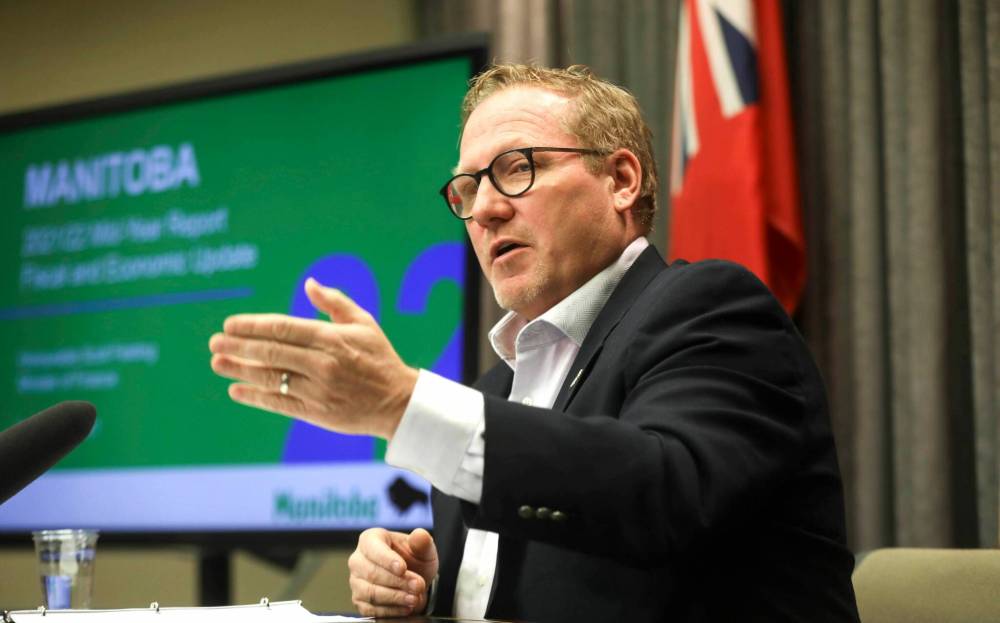Conflict-of-interest law limits what ex-Tory minister can do at KPMG
Advertisement
Read this article for free:
or
Already have an account? Log in here »
To continue reading, please subscribe:
Monthly Digital Subscription
$0 for the first 4 weeks*
- Enjoy unlimited reading on winnipegfreepress.com
- Read the E-Edition, our digital replica newspaper
- Access News Break, our award-winning app
- Play interactive puzzles
*No charge for 4 weeks then price increases to the regular rate of $19.00 plus GST every four weeks. Offer available to new and qualified returning subscribers only. Cancel any time.
Monthly Digital Subscription
$4.75/week*
- Enjoy unlimited reading on winnipegfreepress.com
- Read the E-Edition, our digital replica newspaper
- Access News Break, our award-winning app
- Play interactive puzzles
*Billed as $19 plus GST every four weeks. Cancel any time.
To continue reading, please subscribe:
Add Free Press access to your Brandon Sun subscription for only an additional
$1 for the first 4 weeks*
*Your next subscription payment will increase by $1.00 and you will be charged $16.99 plus GST for four weeks. After four weeks, your payment will increase to $23.99 plus GST every four weeks.
Read unlimited articles for free today:
or
Already have an account? Log in here »
Hey there, time traveller!
This article was published 12/10/2022 (1155 days ago), so information in it may no longer be current.
FORMER Progressive Conservative cabinet minister Scott Fielding has parlayed his government experience into a job with one of Canada’s largest private consulting firms, raising inevitable questions about the potential for perceived conflicts of interest.
After quitting Premier Heather Stefanson’s government in June, the former Kirkfield Park MLA and Winnipeg city councillor has landed at KPMG as a deal adviser.
Fielding will provide strategic advice to clients in Western Canada and at the national level, with a focus on “economic development, infrastructure, finance, fiscal performance, organizational transformation and strategy,” a KPMG ad in the Saturday Free Press business section stated.

Former Finance Minister Scott Fielding.
The former natural resources and northern development minister who was responsible for liquor and lotteries — and was shuffled out of finance in January — is subject to the Legislative Assembly and Executive Council Conflict of Interest Act. It includes rules for former ministers and what they can’t do for a year after leaving office, with fines ranging from $1,000 to $10,000 for those who break them.
“Where a minister acts for or advises the government or a Crown agency with respect to a matter in which the government or Crown agency has an interest, the minister shall not, for a period of one year following the date on which the minister leaves office, act for or on behalf of a person, partnership or unincorporated association or organization in relation to the matter,” the act says.
“Depending on what the minister did and what the new employment involved is, it may limit the activities the former minister can engage in,” said conflict of interest commissioner Jeffrey Schnoor, who could comment generally on the legislation pertaining to former ministers but not specifically on Fielding’s new job.
“This section prohibits a minister from ‘switching sides’ on a specific matter for one year,” Schnoor explained.
Another section deals with former ministers who go to work for someone with whom they’d had official dealings in the year before leaving office, he said.
“In that case, the former minister is prohibited from participating in any dealings their employer might have with the Manitoba government for one year,” Schnoor said. “So, in that case, a former minister could not advise a client in respect of a contract with the Manitoba government.”
Fielding did not respond to a request for comment Tuesday.
An expert on Manitoba politics said Fielding’s move to the consulting firm is no surprise, and neither will be questions about potential or perceived conflicts.
“It’s not surprising that KPMG would reach out to somebody like Mr. Fielding, given his experience in the public sector at two levels of government that he acquired during the course of his years of public service and the connections he’s made,” said Paul Thomas, University of Manitoba political studies professor emeritus.
Fielding served as a city councillor from 2006 to 2014 and was elected to the legislature as part of a Tory majority government in 2016.
“All of those are to the great advantage of a consulting firm that is always looking for new contracts with government,” Thomas said.
At the same time, there are organizations such as Democracy Watch calling for tougher conflict rules for elected officials before and after they leave office — prohibiting them from talking to a prospective, future employer while they’re still in public office, Thomas said, “So people in their twilight years in public office — say, when Fielding was finance minister, wasn’t holding conversations perhaps as part of a sidebar to ongoing use of KPMG,” he said.
“Given the cynical mood that exists today, people will be suspicious there,” Thomas said. “I don’t know what percentage of the population this will set off alarm bells for and say it continues a pattern of people using insider knowledge and insider connections to advance their careers,” he said. “It sullies their public-service reputation and record if they trade in for a lucrative paying job with a management consulting firm, so that will happen,” he said.
“On the other hand, he has to find work somewhere. We don’t want to drive him out of the province. Presumably he’s talented and he has knowledge.”
The question is, determining the right interval for a cooling-off period for a former minister so that person isn’t taking advantage of the capital they’ve built up, Thomas said.
There is one lifetime ban in the conflict-of-interest legislation. A section prohibits all MLAs and ministers from using “insider information” for personal gain or for the gain of another person, Schnoor said. It prohibits the use of information that is not available to the public they acquire in the performance of their official powers, duties and functions to benefit themselves or someone else.
carol.sanders@freepress.mb.ca

Our newsroom depends on a growing audience of readers to power our journalism. If you are not a paid reader, please consider becoming a subscriber.
Our newsroom depends on its audience of readers to power our journalism. Thank you for your support.




